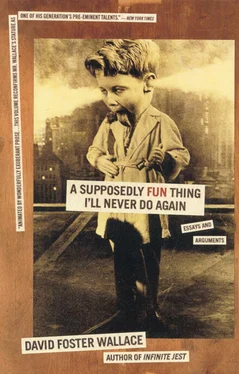A lot of the script people and wardrobe people and production assistants are also female, but they’re of a different genus — younger, less lean and more vulnerable, without the technically savvy self-esteem of the camera/sound women. As opposed to the hands-on women’s weltschmerzian cool, the script and P.A. females all have the same pained “I-went-to-a-really-good-college-and-what-am-I-doing-with-my-life” look in their eyes, the sort of look where you know that if they’re not in twice-a-week therapy it’s only because they can’t afford it.
Another way to distinguish different crewpeople’s status and function is to look at what kind of personal communication gear they have. The rank-and-file grips are pretty much the only people without any kind of personal communicative gear. The rest of the hands-on and technical crew carry walkie-talkies, as do the location manager, the people in touch with the camera truck, and the burly guys manning the road’s barricades. Many of the other crew carry cellular phones in snazzy hip-side holsters, and the amount of cellular-phone talking going on more than lives up to popular stereotypes about LA and cellulars. 25The Second A.D., a young black lady named Simone whom I get to interact with a lot because she’s always having to inform me that I’m in the way of something and need to move (though she isn’t ever crabby or impolite about it), has an actual cellular headset instead of just a holstered cellular phone, though with Simone the headset isn’t an affectation: the poor lady spends more time conferring on the phone than any non-teenage human being I’ve ever seen, and the headset leaves her hands free to write stuff on the various clipboards she carries around in an actual clipboard- holder .
The set’s true executive class — line producer, unit publicist, underwriter, D.R — have personal pagers that sometimes will all sound at once but just slightly out of synch, producing in the weird ionized Santa Ana air a sound-blend that fully qualifies as Lynchian. And that’s how you can tell people apart telecommunicationally. (The exception to every rule is Scott Cameron, the 1st A.D., who bears with Sisyphean resignation the burden of two walkie-talkies, a cellular phone, a pager, and a very serious battery-powered bullhorn all at the same time.)
But then so about like once an hour everybody’s walkie-talkie starts crackling, and then a couple minutes later Lynch and the actual shooting team and cars come hauling back in to Base and everybody on the crew springs into frantic but purposeful action so that from the specular vantage of the roadside cliff the set resembles an anthill that’s been stirred with a stick. Sometimes the shooting team comes back just to change cars for a shot: the production has somehow acquired two identical black Mercedes 6.9’s, and each is now embellished with different kind of filmmaking attachments and equipment. For a particular shot inside the moving Mercedes, some of the grips construct a kind of platform out of reticulate piping and secure it to the hood of the car with clamps and straps, and then various other technicians attach a 35mm Panavision camera, several different complicatedly angled mole and Bambino lights, and a 3’ × 5’ bounce 26to various parts of the hood’s platform. This stuff is locked down tight, and the 2nd Asst. Cameraperson, a breathtaking and all-business lady everyone addresses as “Chesney,” 27fiddles complexly with the camera’s anamorphic lens and various filters. When sunlight off the Mercedes’s windshield becomes a problem, 28the Director of Photography and the camera guy in the especially authentic-looking pith helmet and Chesney all huddle and confer and decide to brace a gauzy diffusion filter between the camera and the windshield.
The camera truck is a complex green pickup whose side door says it’s the property of Camera Trucks, Unltd . The back part has three tiers for gear, lights, a Steadicam, a video monitor and sound feed, and then little seats for David Lynch and the Director of Photography and a camera operator. When it’s back at Base, technical crewpeople converge on the truck in clusters of entomological-looking avidity and efficiency.
During the crews’ frantic activity — all of it punctuated with loud bullhorn commands from Scott Cameron — the technicians from the camera truck and the stand-ins from the cars take their own turns standing around and talking on cellulars and rooting through the baskets of corporate snacks on the snack table looking for stuff they like; i.e. it’s their turn to stand around and kill time. The exterior driving-shots all have stand-ins in the cars, but usually when the shooting team returns to Base the actual name actors will emerge from their trailers and join the roil. Robert Loggia in particular likes to come out and stand around chatting with his stand-in, who’s of the same meaty build and olive complexion and has the same strand-intensive balding pattern and craggy facial menace as Loggia, and of course is identically dressed in mobster Armani, so that from the distance of the roadside cliff their conversation looks like its own surreal metacommentary on parallel identity crises.
David Lynch himself uses the down-time between takes to confer with A.D.’s and producers and to drink coffee and/or micturate into the undergrowth, and to smoke American Spirits and walk pensively around the Mercedeses and camera truck’s technical fray, sometimes holding one hand to his cheek in a way that recalls Jack Benny. Now 50 years old, Lynch still looks like an adult version of the kind of kid who gets beat up a lot at recess. He’s large, not exactly fat but soft-looking, and is far and away the palest person anywhere in view, his paleness dwarfing even the head-shop pallor of the lighting and F/X guys. He wears a black long-sleeved dress shirt with every possible button buttoned, baggy tan Chinos that are too short and flap around his ankles, and a deep-sea fisherman’s cap with a very long bill. The tan cap matches his pants, and his socks match both each other and his shirt, suggesting an extremely nerdy costume that’s been chosen and coordinated with care — a suggestion that with Lynch seems somehow endearing rather than pathetic. The sunglasses he wears on the camera truck are the cheap bulgey wrap-around kind that villains in old Japanese monster movies used to wear. The overstiff quality of his posture suggests either an ultradisciplinarian upbringing or a back brace. The general impression is that of a sort of geeky person who doesn’t especially care whether people think he’s geeky or not, an impression which equals a certain kind of physical dignity.
Lynch’s face is the best thing about him, and I spend a lot of time staring at it from a variety of perspectives as he works the set. In photos of Lynch as a young man, he looks rather uncannily like James Spader, but he doesn’t look like James Spader anymore. His face is now full in the sort of way that makes certain people’s faces square, and it’s pale and soft-looking — the cheeks you can tell are close-shaved daily and then moisturized afterward — and his eyes, which never once do that grotesque looking-in-opposite-directions-at-once thing they were doing on the 1990 Time cover, are large and mild and kind. In case you’re one of the people who figure that Lynch must be as “sick” as his films, know that he doesn’t have the beady or glassy look one associates with degeneracy-grade mental trouble. His eyes are good eyes: he looks at his set with very intense interest, but it’s a warm and full-hearted interest, sort of the way you look when you’re watching somebody you love doing something you also love. He doesn’t fret or intrude on any of the technicians, though he will come over and confer when somebody needs to know what exactly he wants for the next set-up. He’s the sort who manages to appear restful even in activity; i.e. he looks both very alert and very calm. There might be something about his calm that’s a little creepy — one tends to think of really high-end maniacs being oddly calm, e.g. the way Hannibal Lecter’s pulse rate stays under 80 as he bites somebody’s tongue out.
Читать дальше












